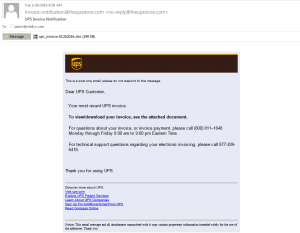Cybercriminals that mount ransomware attacks, where malware holds victims’ files or entire computers hostage until they pay a ransom, are increasingly targeting businesses, according to new research from the Online Trust Alliance (OTA).
Criminals typically deliver ransomware via a standard phishing attack – a malicious email that appears to be genuine. The unsuspecting user clicks a link and downloads the malware to their computer.

When that malware is ransomware, it typically encrypts the user’s files, often targeting files with common extensions like .doc or .docx (Microsoft Word), .xsl or .xslx (Microsoft Excel) or .pdf (Portable Document Format), among others.
The malware then presents the user with a choice: either pay a ransom or lose the files for good. Furthermore, trying to unencrypt the files or otherwise stop the malware results in immediate deletion of the files.
Hapless users typically relent, and pay the criminal, usually in Bitcoin – the preferred method of payment for criminals looking for a quick score while covering their tracks.
Ransomware has been around for several years now, but what’s changed is the professionalism of the criminals. “Much like surge pricing for taxis, cybercriminals now target and calculate their ransomware pricing based on company size, market value and much more,” explains Craig Spiezle, Executive Director and President of OTA. “Cyber-surge pricing of corporate data is becoming widespread, increasing the impact and costs for businesses and their employees worldwide.”
When a user becomes a ransomware victim on their home computer, the files at risk are likely to be local to that system – but the same isn’t true in the business environment. Instead, Ransomware can target files on shared drives, both locally and in the cloud.
The worst case scenario: the ransomware takes down an enterprise application entirely. Some applications depend upon the availability of certain files on the network, so if those files disappear, the entire app may cease to function.
Read the entire article at http://www.forbes.com/sites/jasonbloomberg/2016/01/26/ransomware-coming-to-a-business-near-you/.
Intellyx advises companies on their digital transformation initiatives and helps vendors communicate their agility stories. As of the time of writing, none of the organizations mentioned in this article are Intellyx customers. Image credit: Jason Bloomberg.



